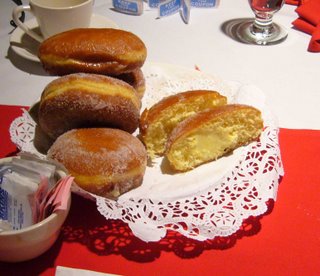Putting It Out of Its Misery
 Today I attended the "Polka Dinner with Jimmy Sturr," a fundraiser for the Polish Center of Discovery and Learning in Chicopee, Massachusetts. A dinner of kiełbasa, pierogi, gołumbki, kapusta, potatoes, rye bread, pastry, and coffee was followed by an appeal for donations to the Center, followed by dancing to the music of Jimmy Sturr, followed by a raffle. I could have been five years old as I sat between my cousins Joanne and Geraldine. Nothing much has changed in all that time.
Today I attended the "Polka Dinner with Jimmy Sturr," a fundraiser for the Polish Center of Discovery and Learning in Chicopee, Massachusetts. A dinner of kiełbasa, pierogi, gołumbki, kapusta, potatoes, rye bread, pastry, and coffee was followed by an appeal for donations to the Center, followed by dancing to the music of Jimmy Sturr, followed by a raffle. I could have been five years old as I sat between my cousins Joanne and Geraldine. Nothing much has changed in all that time.My mother, Joanne's mother, and Geri's mother were all sisters. Back in the day, we'd sit around the kitchen table in my grandmother's kitchen, eating and talking, eating and smoking, eating and playing cards. The aunts, uncles, and cousins numbered in the dozens, no one had moved very far away, and 23 Frontenac Street, Indian Orchard, was headquarters for everybody.
As long as my grandmother--"Babu" to everyone--was alive, she was a constant presence at the stove. When she died, Joanne's mother, Julia, took her place. When she died, Aunt Helen moved in to run things. Helen wasn't the cook her mother and sister had been, so when my mother got tired of her lonely widowhood, she moved back home and ran the kitchen.
Apparently, Babu fed not only her husband and nine children, but everyone else in the neighborhood as well. Everyone had a pack of kids back then--there must have been hundreds of children in a one-block radius from our family mansion--and everyone was poor. More than one family credited Babu with keeping them from starving to death during the Great Depression.
Babu couldn't speak English, and I couldn't speak Polish. My memories of her are mainly of being pinched and cuddled, being spoken to in an incomprehensible tongue, and of having a piece of rye bread slathered with butter pressed into my hand. I guess I was too skinny for her liking--but even had I been a chubette, it would have been the same. Food to her was love.
So every memory I have of family is intimately associated with eating. We'd clear the table, someone would walk in, and out would come the food and plates again. "I've already had supper" was no excuse. "How many times?" somebody else would reply.
Not that we were gluttons. On the contrary, we were dainty in our habits. A platter of pastry would be set down with the injunction, "Eat!"
"I couldn't possibly," you were supposed to reply. "Oh...it's homemade? Well, in that case...." And then you'd slice off a corner and try it. And then, when you were pressed continually to have more, you'd take another sliver, "...just to be polite." And so on and on it went, until only a sliver was left. And then you'd say as you reached for it, "Well, let me put this out of its misery."
Dessert today was a plate of freshly-made doughnuts, half sugared and half glazed. Cousin Geri, who is 5'8" at least and can't weigh more than ninety pounds, automatically cut a sugared one in two. Someone else did the same to its glazed sister. A few minutes later, the plate was empty anyway. I happened to be the old maid today. I was full...but someone had to put that last piece out of its misery.
Labels: family, Jimmy Sturr, Polish Center of Discovery and Learning


0 Comments:
Post a Comment
<< Home